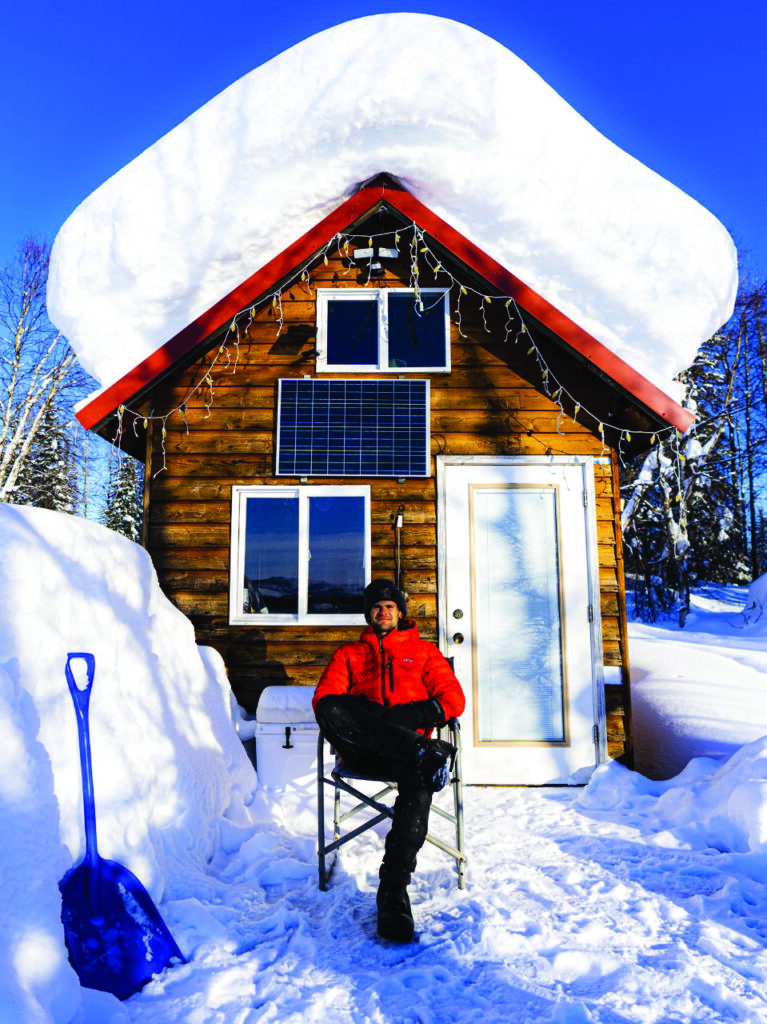 DEGREE: B.S. in economics
DEGREE: B.S. in economics
JOB TITLE: Photographer, Tordrillo Mountain Lodge in Alaska
FAVORITE TRINITY MEMORY: By a long shot, winning a national championship in ice hockey my sophomore year.
What do you do in your position? I have a wide range of job responsibilities at Tordrillo Mountain Lodge, a luxury helicopter skiing/adventure lodge located 60 miles west of Anchorage on Judd Lake. When you work off the grid like I do, you have to be resourceful and a “jack of all trades.” One of my many titles is photographer, and with that I oversee and provide content for the lodge’s social media. I also keep the website updated with photos and videos and supply photos for publishers. In addition, I manage an off-the-grid power plant, which consists of two large generators and a cutting-edge battery storage/inverter system. In the summer, I guide helicopter excursions to our via ferrata [a steel cable climbing route], photography trips, and hiking on glaciers.
What path did you take to get there? After college, I went home to Alaska, having no idea what I wanted to do but with little interest in working in an office. I grew up in the Alaskan outdoors, and I focused on finding employment where I could be outside enjoying its unique challenges. After working at miscellaneous jobs around Anchorage, I started at the lodge shoveling snow. As I worked my way up, I hoped to have an opportunity to practice my other passion—outdoor photography—at this world-renowned location. I ended up staying on by learning some electrical engineering after being put in charge of a new solar off-grid power system that supplies the lodge with electricity. From there, I have moved to guiding in the summer and supplying photos and videos for the guests, the lodge, and its sponsors.
What do you enjoy most about what you do? I enjoy the challenge of living every day in one of the most hostile—and yet most beautiful—environments in the country. Most of my days start with either a short snowmobile ride in the winter or a paddleboard across the lake in the summer to our lodge. I am surrounded by wildlife, incredible mountains, and true wilderness, where I have the opportunity to go skiing, fishing, hiking, and exploring. I have access to thousands of acres of mountains and rivers that are lost in time and rarely visited by a person. Out our front door, we have everything from volcanoes to glaciers to world-class fishing and bear viewing. It is really special to share these great adventures and to witness others experience the beauty and awe of the area for themselves.
What are the biggest challenges you face? Making people feel comfortable and safe in places totally outside of their comfort zone. As an example, I guide people who have never climbed on a via ferrata and have to talk them through some of their biggest fears as they climb across a cliff face.
How did Trinity prepare you for what you do now? My time at Trinity was an introduction to the rest of the world outside of Alaska, teaching me how to communicate with a wide range of people. That has become extremely valuable when guiding clients from around the world. I have always been passionate about the environment, and the courses I took at Trinity helped me develop my internal philosophy that guides me in many of the decisions I confront today. Ice hockey at Trinity taught me the importance of hard work, being a good teammate, and sacrifice.
Your brother Ryan was a classmate and ice hockey teammate. What was that like to share the Trinity experience with him? Being able to share four years of college with my brother was and will always be a very special part of my college experience. We roomed together both on and off campus, we took a lot of the same classes, we were both econ majors, and we played hockey together.
What was the most memorable course you took at Trinity? “Political Ecology” was by far the coolest course I had at Trinity. Learning about the cause and effect of environmental decisions from an unbiased view is something I try to implement in my life. My own beliefs are centered upon the importance of our environment and how it should impact our political, social, and economic decision-making.
Was there a professor at Trinity who was particularly influential? Shafqat Hussain. Although I did not meet him until my senior spring, I found his view on the world fascinating. He taught me to analyze problems from the viewpoint of others to better formulate and support my arguments. I learned about parts of the world that I have always wanted to visit and fascinating topics like the studies of snow leopards. My interactions with him showed me a person who was interested in the environment, studied the environment, and made it a focus of economic theory. Again, this is a philosophy that has guided me since I left Trinity.
For more on Cole’s photography, please visit https://www.brandonmcole.com/.
